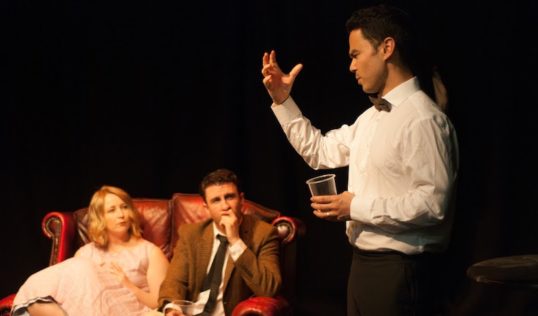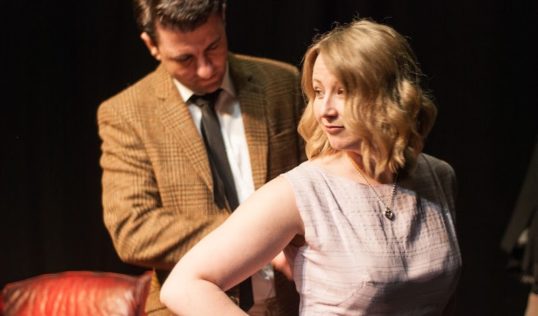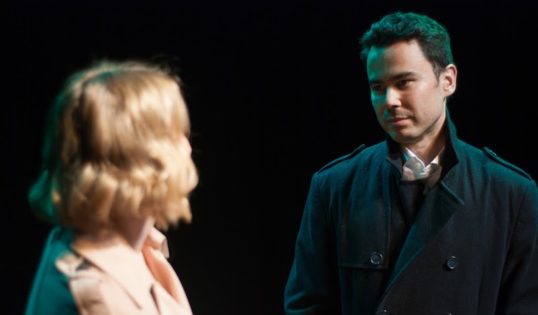The Pride
★★★☆☆ Involving
Assembly Roxy: Wed 13–Sat 16 Jun 2018
Review by Hugh Simpson
The Pride, the debut production by Different Works at the Assembly Roxy, is very good at showing how the repressive urge for conformity destroys everyone, not just those who are seen as ‘different’.
Alexi Kaye Campbell’s 2008 play is largely a beautifully crafted work. It uses a split time-scheme to show the lives of parallel characters in 1958 and 2008, showing how changing attitudes to sexuality have impacted on the lives of LGBTQ people and those around them. It also makes clear that some things have not changed very much.
In 1958, Philip is a buttoned-up estate agent married to illustrator Sylvia, whose first meeting with her collaborator Oliver reopens feelings he has tried to suppress. In 2008, Philip is a photographer whose relationship with a freelance journalist is threatened by Oliver’s preoccupation with anonymous sexual encounters; Sylvia here is an actor who is Oliver’s friend.
The 1950s sections are suitably Rattiganesque in their depiction ofunspokenfeelings and hidden meanings, while the more modern scenes are broader and with more overtly comic moments – although there is still an ever-present edge of quiet desperation.
There are certainly some upsetting and decidedly ‘adult’ moments here, which are negotiated successfully by Michael Davies (Philip) and Ian Fallon (Oliver). Davies’s portrayal of the 1950s Philip, a man who would rather destroy himself and everyone around him rather than face up to himself, is particularly good.
Fallon suffers a little from both Olivers being given many lines that are statements of philosophical intent rather than expressions of the character, but is effective as the self-obsessed, self-dramatising modern Oliver.
self-exploration
The tendency of all the characters to keep telling us ‘who they really are’, when they have already shown us perfectly adequately, is the drawback of an otherwise very fine play. This is echoed by the way the characters keep reinforcing the fact that they are the same people in different time periods with different opportunities, long after this has been made clear.
The large sections of self-exploration in the dialogue can obviously make this a very static piece, and this is the main fault of this production. Director Steve Griffin gets a great deal right, and should be congratulated for the nuanced performances of the cast, but he does not always find a way to make the conversations theatrical.
This leads to large sections of the performers sitting down beside each other, which not only saps some of the energy from the play, but also causes practical problems. The Roxy’s downstairs venue may not be huge but has some awkward sightlines and there are times when at least one actor is not readily visible to many of the audience.
One performer who is always able to overcome such limitations is Louise Sables, who is excellent as Sylvia. A lengthy description by the 1950s version about how she knew what was happening between the two men is rendered unnecessary by the way she manages to convey it at the time, simply through an awkward shuffle on her chair and a sidelong glance.
praiseworthy versatility
The other parts are played by Griffin himself with praiseworthy versatility. He supplies a chilling moment as a 1950s doctor practising aversion therapy to ‘cure’ what he sees as a ‘perversion’. This brings home that, despite all of the progress, some things have not changed that much, considering we still have elected representatives who believe in such nonsense.
As a celebration of difference, this production works precisely because it is such a bittersweet one – troubling, not always as smooth as you would want, but ultimately hopeful.
Running time 2 hours 25 minutes including one interval
Assembly Roxy, 2 Roxburgh Place, EH8 9SU
Wednesday 13– Saturday 16 June 2018
Daily at 7.30 pm.
Information and tickets: www.assemblyroxy.com.
The production is one of the events associated with Edinburgh Pride 2018.
ENDS























